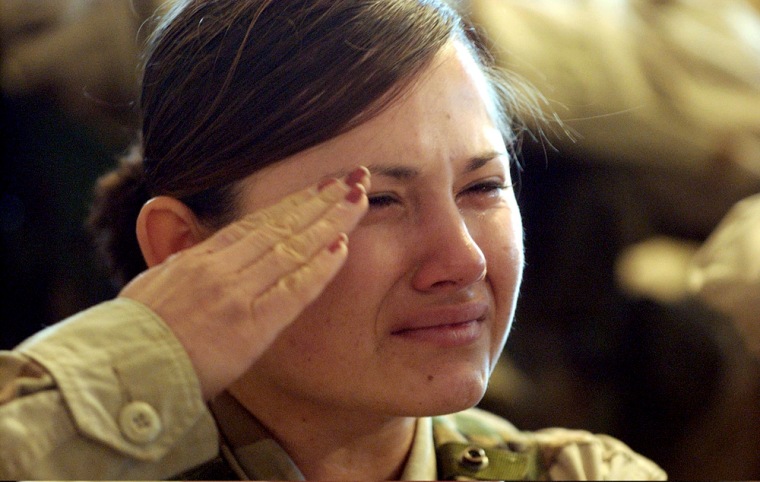A military culture that values strength and a "can do" spirit is discouraging thousands of soldiers from seeking help to heal the emotional scars of war in Iraq and Afghanistan, despite top-level efforts to overcome the stigma, commanders and veterans say.
Up to one-fifth of the more than 1.7 million military members who have served in Iraq or Afghanistan are believed to have symptoms of anxiety, depression and other emotional problems. Some studies show that about half of those who need help do not seek it.
"It's a reality that for some — certainly not all, but for some — there's a stigma to stepping forward for behavioral health," Maj. David Cabrera, who runs counseling services at a military hospital in Germany, told The Associated Press.
"Our goal is to eradicate the stigma," he said. "We're not there yet."
Encouraging more soldiers to seek help, and training leaders to spot signs of trouble, have taken on new urgency since the fatal shooting last Monday of five U.S. service members at a counseling center at Baghdad's Camp Liberty.
Army Sgt. John M. Russell has been charged with five counts of murder. He was finishing his third tour in Iraq and had been ordered to seek counseling at the center, the Army said.
Sergeants on their third or fourth assignments to Iraq or Afghanistan are more than twice as likely to suffer mental health problems as those on their first assignment to a combat zone, according an Army study last year.
'Battle fatigue'
Combat stress is common in every war — including "battle fatigue" cases in World War II and the lasting trauma still suffered by thousands of veterans of the Vietnam conflict.
What makes the current conflicts different are the frequent, repeating rotations. Most soldiers spent just one or two assignments in Vietnam, but many American soldiers and Marines are on their third or fourth tours in Iraq and Afghanistan.
Units return home to the United States or Germany, only to begin soon preparing for their next deployment, adding strains on both the soldiers and their families.
Military officials insist they are keenly aware of the growing stress problem in the ranks and are moving quickly to expand counseling facilities not only in war zones but at bases in the U.S. and Europe for troops who return from the fighting.
Most major bases in Iraq maintain combat stress clinics, where soldiers can visit counselors and relax for a few days away from the pressures of their jobs.
Two of the officers killed last Monday at the counseling center had been visiting units in the Baghdad area in the weeks before their deaths, explaining programs the counseling centers offer and encouraging soldiers to take advantage of them.
"The only way we're going to keep our soldiers fit to fight, if you will, is to make sure it is a holistic approach, not just the physical but mental readiness," Lt. Gen. Kenneth W. Hunzeker, an Iraq veteran and corps commander in Germany, told AP.
Getting 'a little' help
Some senior officers, notably Gen. Carter Ham, who now commands U.S. Army forces in Europe, have spoken openly about suffering from combat stress, including sleep problems and exaggerated emotions, after going through traumatic experiences on the Iraqi battlefield.
Ham, who commanded U.S. troops in the northern Iraqi city of Mosul during major fighting there, said he spoke out to encourage others to face the emotional scars of war.
"Frankly, it's a little weird to me that people are making a big deal about it," Ham told the Stars and Stripes newspaper in an interview last January. "Like lots of soldiers I needed a little help, and I got a little help."
Putting on a face
But changing attitudes in the ranks has proven a tougher challenge. Young combat soldiers don't want to seem weak in front of comrades. Sergeants who are supposed to be role models worry about endangering their careers.
Sgt. 1st Class Gary Frey, 36, on his second tour of Iraq, said the Army does not consider it a bad mark against a soldier if the soldier seeks counseling. But going to a combat stress center "may be viewed as a weakness by individuals," he said.
"We are alpha males in the infantry," he said.
Tom Tarantino, who served as a platoon leader in Baghdad from January 2005 until January 2006, said career soldiers are especially reluctant to seek help because "you don't want your command to think you can't do your job."
Also, pressure to perform the mission can make junior officers and sergeants impatient with soldiers deemed problem cases, he said.
"After very long deployments, when you're supposed to be healing and decompressing, you are preparing to go again," Tarantino said. "Everybody is so strained that leaders could make the wrong decisions and chuck out someone as a discipline case, instead of seeing it as a mental health problem."
Cleaning out your head
Tarantino, who now works for Iraq and Afghanistan Veterans of America, a support and lobbying group in the United States, said the military needs to accelerate training of sergeants and junior officers to be more sensitive to signs of stress, because most cases can be successfully treated.
"You have to look at it like a weapons system. After a big sandstorm, you have to clean the weapons. After a traumatic event, you have to clean your head. You're not personally weak. You're just broken and you need to fix it," he said.
Tarantino said that when he returned from Iraq, he went to a stress clinic and urged his soldiers to do the same.
The veterans group that he works for recommends mandatory mental health screening for all soldiers returning from Iraq or Afghanistan.
"If everyone goes, it's no stigma," he said. "When I came home, I went and saw a counselor. And I made sure all my soldiers knew I was going."
